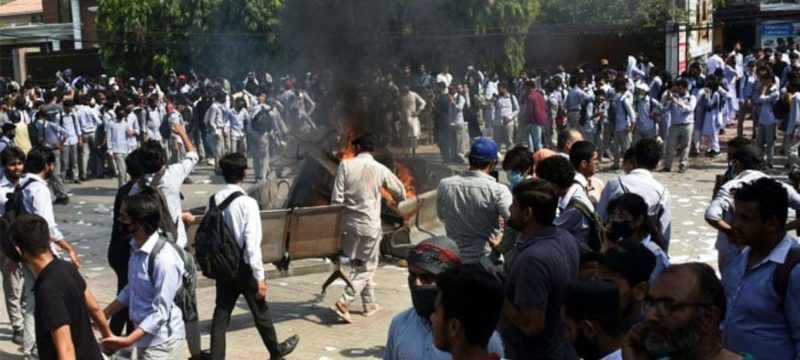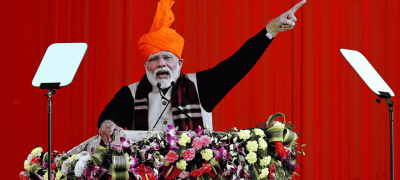The Punjab College rape case controversy in Lahore ignited Pakistan’s largest student-led protests, fueled by allegations that a female student was sexually assaulted by a security guard on campus.
Despite these claims spreading across social media and sparking outrage, the college administration and government officials swiftly dismissed the accusations as “fabricated,” triggering an intense standoff between students and authorities.
Read more: Security Guard Arrested in Punjab for Alleged Assault on College Student
The Allegations and Protest Movement
The allegations began circulating online, claiming that a security guard had raped a female student in a secluded area of the Punjab College for Women. While the accused guard denied the charges, this sparked student outrage, leading to widespread protests across Lahore and other cities in Punjab. Students demanded an independent investigation and improved security at educational institutions, arguing that such cases often go unaddressed.
The protests grew rapidly, with thousands of students from various colleges and universities joining the movement. Demonstrators gathered outside the Punjab Assembly, where confrontations with police resulted in injuries to several students. The scale of these protests made it clear that the issue had struck a nerve, not just with those involved but also with broader society, demanding immediate action on harassment and safety protocols in educational institutions.
Institutional Denial and Government Response
Despite the scale of the protests, Punjab College management and government officials, including Punjab Information Minister Azma Bukhari, denied the rape allegations. They labeled the claims as misinformation spread by social media, arguing that no credible evidence had surfaced to support them. Minister Bukhari reiterated that “unfounded allegations harm our institutions,” framing the protests as unnecessary and based on rumors.
In response to mounting pressure, the Punjab government formed a seven-member inquiry committee tasked with investigating the claims. The Directorate of Public Instruction (DPI) Colleges also suspended the college’s registration, although the administration continued to deny any wrongdoing.
This stance, however, drew sharp criticism from human rights organizations and student activists, who accused the authorities of being dismissive. Activist and lawyer Jibran Nasir tweeted: “The cries of young women demanding justice must not fall on deaf ears.” Many believed the government should have responded with a more transparent and empathetic approach rather than dismissing the claims outright before a proper investigation.
Political Reaction and Social Media Discourse
The case also ignited debates among political figures. Opposition parties, including members of the Pakistan People’s Party (PPP), condemned the government’s quick dismissal of the allegations without due process. On social media, activists and students continued to call for justice, using platforms like Twitter to raise awareness and amplify their demands for reform. Meanwhile, ruling party officials attempted to control the narrative, with Minister Bukhari tweeting, “The truth will prevail, and baseless rumors should not distract from real issues.”
Flaws in Crisis Management
The management of this crisis exposed several critical flaws, particularly regarding how the authorities handled both the incident and its aftermath.
Premature Denial: The immediate dismissal of the allegations without a thorough investigation only fueled public outrage. Authorities appeared more interested in damage control than addressing student concerns, shaking public trust in the investigation process.
Lack of Victim Support: The college failed to offer any visible support for the alleged victim, such as access to counseling, medical assistance, or legal services. This not only raised concerns about the institution’s ability to handle such sensitive situations but also signaled a lack of concern for student well-being.
Poor Communication: The administration’s refusal to engage with protesting students or open a meaningful dialogue further deepened the sense of alienation. Protests might have been de-escalated had there been efforts to meet with protest leaders and address their concerns head-on.
Ineffective Harassment Policies: The incident revealed the need for stronger anti-harassment policies within educational institutions. A clear reporting framework, along with preventive committees, could have reduced the scale of the protests and reassured students that their safety was being prioritized.
How the Situation Could Have Been Handled Better
Transparent Investigation: The administration should have promptly launched an impartial, transparent investigation. This would have helped ease tensions while ensuring that both the alleged victim and the accused received due process.
Support Mechanisms for Victims: Establishing support mechanisms, such as counseling services and medical aid, would have demonstrated the institution’s commitment to student safety, even in the absence of conclusive evidence.
Open Dialogue with Protesters: Rather than dismissing the protests, engaging directly with students through open forums or mediated discussions could have provided a platform for their voices to be heard, fostering trust and possibly preventing violence.
Strengthened Anti-Harassment Policies: Even in situations where allegations are disputed, educational institutions should commit to continuously strengthening policies to prevent harassment and assault. Establishing prevention committees and regular safety reviews could prevent similar incidents in the future.
Conclusion
The Punjab College rape case and the subsequent protests have sparked an important national conversation about how educational institutions handle sexual misconduct allegations. The students’ determination in demanding justice highlights a generational shift towards accountability and reform. Moving forward, it is crucial for both the government and educational institutions to respond effectively and with empathy, ensuring that future incidents are met with transparency, victim support, and timely investigations.
This case underscores the need for comprehensive reforms in handling sexual harassment and assault within Pakistan’s educational institutions, to create a safer and more supportive environment for all students.









